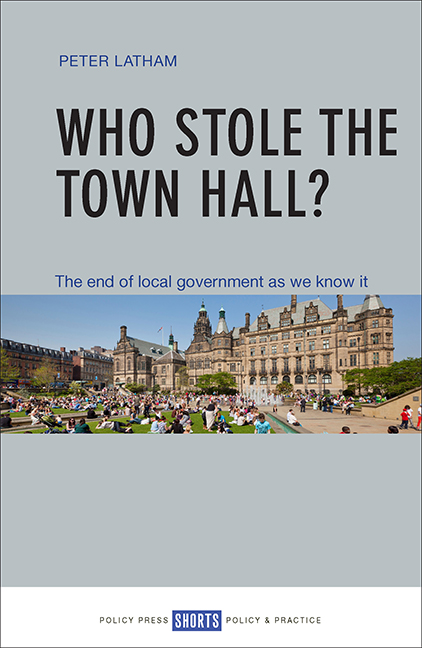Book contents
- Frontmatter
- Dedication
- Contents
- List of tables
- Acknowledgements
- Foreword
- About the author
- List of abbreviations
- Introduction
- 1 The Localism Act, Open Public Services and the neoliberalisation of councils
- 2 Imposed ‘metro’ mayors: new wine in old bottles
- 3 Police and Crime Commissioners: another ‘half-baked import’
- 4 Local government finance
- 5 Towards a new basis for federal, regional and local democracy
- References
- Index
- Frontmatter
- Dedication
- Contents
- List of tables
- Acknowledgements
- Foreword
- About the author
- List of abbreviations
- Introduction
- 1 The Localism Act, Open Public Services and the neoliberalisation of councils
- 2 Imposed ‘metro’ mayors: new wine in old bottles
- 3 Police and Crime Commissioners: another ‘half-baked import’
- 4 Local government finance
- 5 Towards a new basis for federal, regional and local democracy
- References
- Index
Summary
My previous book, The State and Local Government (Latham, 2011a), analysed developments in the UK – and other advanced capitalist countries and South Africa – plus the south Indian state of Kerala, Cuba, Venezuela and the Brazilian city of Porto Alegre: to show that there are alternative models of ‘socialist decentralisation’ in local government to neoliberal ‘austerianism/localism’.
The introduction of executive government in England and Wales since New Labour's Local Government Act 2000, as Chapter One shows, concentrated decision-making powers in fewer hands. The Local Government and Public Involvement in Health Act 2007, moreover, gave council leaders virtually the same powers as local authority directly elected mayors (DEMs). And in most authorities the committee system was replaced by the cabinet, overview and scrutiny system. Hence most councillors no longer make policy, and feel marginalised, with little influence over issues that affect their local areas, although, since the Localism Act 2011 allowed them to, 13 English councils have reverted to the committee system. Council leaders’ powers have also massively increased via the ‘payroll vote’ of special responsibility allowances (SRAs). Therefore, as the prospect of fewer and lower SRAs may be the main reason why only 13 councils have reverted to the committee system since the Localism Act, Chapter One proposes that no councillors should be paid more than the median gross weekly full-time earnings in their locality.
The privatisation model in the Tory-led Coalition government's White Paper titled Open Public Services (HM Government, 2011), as Chapter One also shows, is based on Payment for Success, published in 2010 by three senior partners at KPMG (Downey, Kirby and Sherlock, 2010). Councils are also being neoliberalised via new models of local government that prioritise the interests of property developers and big business. The UK outsourcing market is now the second-largest in the world outside the US; and the amount spent by local authorities on outsourced public services almost doubled from £64 billion during the last Labour government to £120 billion during the Tory-led Coalition government. Thus, contrary to the government's empowerment rhetoric, this book argues that the government's main purpose is to complete the privatisation of local government and other public services – started under previous Tory governments and intensified under New Labour – in order to restore the conditions in which profitable investment and capital accumulation can take place.
- Type
- Chapter
- Information
- Who Stole the Town Hall?The End of Local Government as We Know It, pp. 1 - 6Publisher: Bristol University PressPrint publication year: 2017



